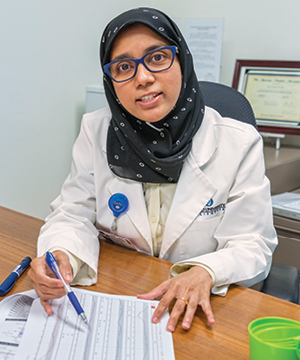Get Back on Track to Tackle Diabetes

Eat less. Do more.
If only it were that easy.
Those simple instructions may not be so simple for people trying to manage their diabetes, according to Jay Shubrook, D.O., diabetologist for NorthBay Healthcare. “It can be hard to know where to start.”
And then came COVID-19.
“The pandemic disrupted our normalcy, changed our habits,” Dr. Shubrook added. “Gyms and farmers markets were closed. Malls closed to walkers. Some even became afraid to go just outside. We know that some of our diabetic and cardiovascular patients got worse during the pandemic, especially if they avoided regular health care.”
“It has been over a year since COVID-19 changed our lifestyles,” added Sumera Ahmed, M.D., NorthBay diabetologist. “People with diabetes have been seeing a worsening of their glucose control due to substantial decrease in physical activity and exercise.”
But now it’s time to get back on track, Dr. Shubrook advised.
“The healthcare system is ready for you to return and get the care you need. Please don’t wait and possibly make your condition worse.”
And that is good advice, especially for those who might have been newly diagnosed during the pandemic.
“Many times, my patients’ first reaction to hearing they have diabetes is a bit fatalistic,” Dr. Shubrook said. “Then they ask, ‘What do I do, where do I start?’”
Dr. Shubrook has encouraging words.
“The truth is, diabetes is 95 percent preventable, and it can be self-managed,” he explained.
The trick is to find the right mix of activities and diet to match each individual’s needs and personal preferences. With diet and exercise in balance, the disease — and its side effects — can be managed, especially with the help of a diabetologist.
Why a diabetologist?
“Diabetes is a complicated condition and most primary care providers are overwhelmed enough as it is helping their patients,” Dr. Shubrook said. “A diabetologist has put a special focus on this disease and spends full time, every day, collecting research, tools and resources to help their patients manage the condition.”
Drs. Shubrook and Ahmed team up with John McKenna, M.D., endocrinologist; Clipper Young, PharmD, a clinical pharmacist; and Tamara Stogner, R.N., diabetes educator, to care for NorthBay’s patients with diabetes and other metabolic disorders, and they’ve honed some of their diet and exercise advice to adjust to pandemic times.
The American Diabetes Association (ADA) recommends that most adults should engage in 150 minutes or more of moderate to vigorous aerobic exercise per week, Dr. Ahmed noted, so that’s a good place to start.
Some ways to get your 150 minutes in could be by jogging, brisk walking, hiking and biking.
“Walking up and down stairs, using resistance bands and kettlebells and weights are also ways to work in some exercise,” she added.
“We do have success stories, where patients took advantage of pandemic times to create new, better habits,” Dr. Shubrook said. “Even small changes can help, and it’s never too late to start.”



